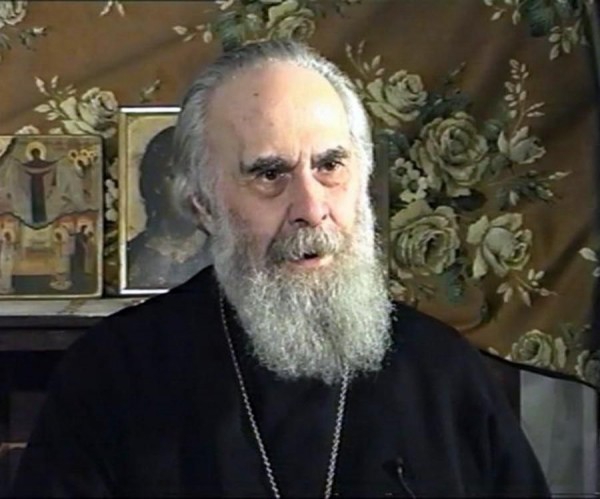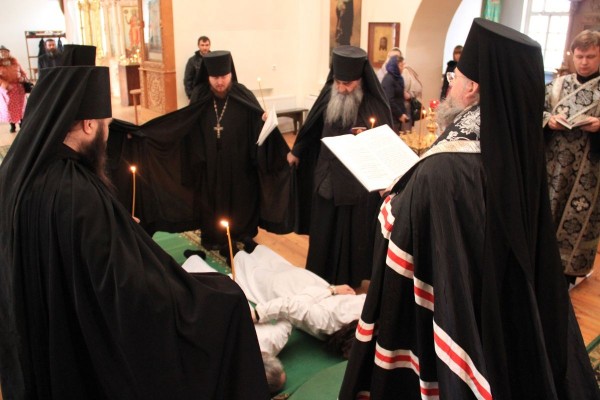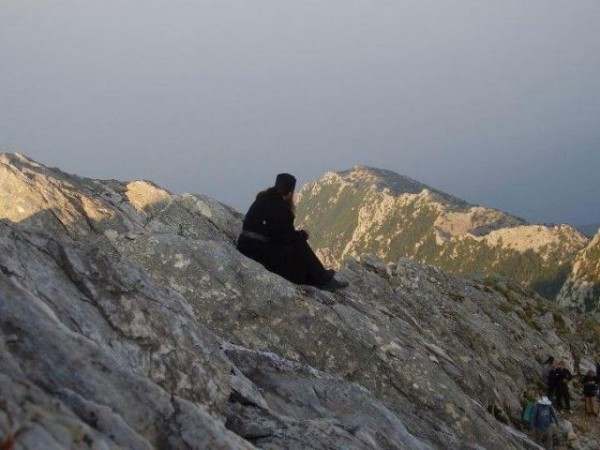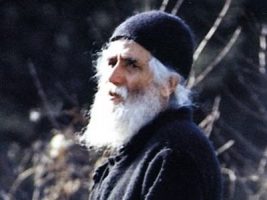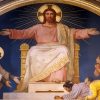I have been asked to say a few words about myself to introduce the theme of the monastic life. I will skip the first part of my biography—a period in which I was a complete unbeliever—and the fact that God allowed me to meet Him suddenly at a moment when I was trying as hard as I could to convince myself that He did not exist, and that Christ can be rejected and the Gospel despised and ignored.
I prefer to speak to you about the monastic quest that led some of us to make profession in circumstances that will probably seem strange to you. The regular monastic life, that of monasteries and convents, is of course the monastic life as we see it in history after the triumph of Christianity. But since Christianity has come to be persecuted—violently, consciously, scientifically and with full determination, in certain countries—and since the Russian Orthodox have found themselves scattered throughout the world, without the material and sometimes the moral possibility of creating monastic communities, we have had to rethink the problem of the monastic vows and vocation and how they are to be expressed in our lives.
These material circumstances are very simple and too obvious to dwell on: an émigré Church, especially during the first twenty years, was in no state to found communities. A community can live either by its work or by the charity—that is, the fact that it is cherished—of the Church. Both ways were for a long time impossible for us. But there was also a moral reason why many of us, in spite of our desires, were unable to enter monasteries. Some went to Mt Athos, others to monasteries in Greece, others to the Balkans, at the time when the Balkans were still on this side of the Iron Curtain. But many of us had to give up that hope because we were faced with the Church’s need. Three of us, between 1931 and the end of the war, sought together to find a monastic life. All three of us had decided just to lead the life of monks and never become priests. And all three of us came to a bad end, so to speak—all three of us have become priests. Each time one of us made profession, he was sooner or later summoned by his bishop and told: “You can remain a monk if you wish. But I have ten parishes without priests. Can you leave without the sacraments—without Communion, without Baptism—people whom you might serve?” And we all three sooner or later decided to take the step.
However, I should like to say something about that quest for monasticism in abnormal conditions, and the link we discovered between the priesthood and our monastic life. It may seem strange to you that I speak as a monk. I live outside any monastery. I made my profession in 1939 and I have never had the opportunity (except for some hopelessly short periods) to be in a community. And yet, my two companions and I feel ourselves deeply bound to the monastic tradition and mystery.
The first thing in the monastic life is a call, a vocation. A vocation is something that does not depend on us. The answer depends on us; but the call is an act of God. And if God calls, one can’t say to Him, “Lord, the circumstances of life today are such that I cannot carry out what you call me to do.” A call from God is a certitude that what He calls us to is possible. The only question is, “How?” We three who felt ourselves called to a life of evangelical renunciation never asked ourselves whether it was possible. We asked ourselves how God willed us to carry that vocation out. In reality, the problem was partly artificial. During the first period of our quest we asked ourselves how we could form a community. We spent a long time looking for the means and found that we did not have them. Next, we asked ourselves what makes a monk. Is it a life in common? Is it living under a common, fixed rule? Is it living in enclosure? We turned to the Desert Fathers, because they in their times found themselves in a similar situation to ours. They could refer to no precedent, nothing in the past. The first men who went off to the desert, called by God to a monastic life, could not imitate, for better or for worse, anything that had been done before. They had to invent everything, on the base of the will of God and a definite and very exigent call.
We then began asking ourselves questions about monastic stability, looking for its meaning in the interior forum. In the exterior forum, the stability classic in Orthodox monasticism is a stability of enclosure. There is a line, in space, beyond which one does not go. But is it the fact of being limited by a line drawn on the ground that makes one stable? What does stability consist in? We discovered that at the heart of stability there is the certitude that God is everywhere, that we have no need to seek God elsewhere, that if I can’t find God here I shan’t find Him anywhere, because the Kingdom of God begins within us. Consequently, the first thing about stability is the certitude that I can stand before God wherever I am; and that it is enough for me to stand before God wholly, immobile, so to speak—the place hardly matters. The place does matter, because it helps or hinders. It is easier to stand before God in the silence of a cell or the fellowship of an act of prayer in a convent chapel than in the circumstances of war or in the market-place. Nevertheless, it is those circumstances that can serve as a criterion of our stability. To be stable when there is nothing to hinder us is easy; to be stable when everything hinders us gives us a certitude that we have found our centre of gravity.
So we began to look for this centre of gravity. We discovered that if we do not let the world penetrate into us, there is enough room within us for us to stand, silent and adoring, before the living God. One of the Fathers of the ancient Church said that we must learn to live completely in our skins: not to let our desire and curiosity go outside; to be completely gathered together in the centre of ourselves. Unless we do that, geographical stability is impossible. I am a prison chaplain. Theoretically, the prison cell is the ideal condition for interior stability. The fact that one is put into prison is perhaps an even more ideal condition than being in a cell by choice, because then one is certain that even in the moment of temptation one will not be able to go out. But you know perfectly well—imagination is enough to tell you—that being in prison is very different from being stable. The prisoner’s heart is outside his cell. All his interests are outside the prison walls. All his life is outside. Only his body is kept prisoner.
So we looked for the state of stability by looking for a form of prayer that would itself be a form of stability. And also by detachment from the outside world. I shall not have time to speak about the prayer of stability. From the start, we used a traditional prayer of the Orthodox Church, commonly called the Jesus Prayer because it is centred on the name of the Word made flesh: “Lord Jesus Christ, Son of God, have pity on me a sinner.” In a way, this is simple. Detachment from the outside world is something much more complex. If one can withdraw to the desert or a cell in a monastery, the outside world is reduced, but it does not disappear. We have only to be two or three gathered together, and not only is the Lord in the midst of us, but the first problems of personal relations appear. We have only to have a job to carry out, and we are prisoner of it, we cannot detach ourselves from it.
So we sought for a way of being in the world, engaged in a job (and it was necessary, simply to live—to eat, to clothe ourselves, to feed and clothe other people), without belonging to it. We discovered that it was only obedience, but an obedience as radical as that of the Desert Fathers, that could detach us from dependence on action, dependence on our work. If you do your work as a work of obedience, only the obedience counts. The work no longer counts, in itself. It matters little whether it is a success or a failure, provided that you have carried it out as perfectly as you are able.
This was something that we discovered under the direction of two spiritual fathers who taught us a great deal. To speak only of my own spiritual father, he was a man of a simplicity and inner freedom that I have never met elsewhere. But he was also absolutely exigent. At the time when I wanted to make monastic profession, after having been under his direction for about ten years, I asked him the question and he answered:
“Yes, you can make profession the day you come and say to me, ‘Here I am’, without asking any questions about the future.”
“Yes, but Father, you realize that my mother is sick and my grandmother very old…”
“As long as you worry about your mother and grandmother, don’t talk about monastic profession. You’re not trusting either in God or in obedience.”
It took me several years to learn that God’s demands are absolute. Each time I asked God the question, He answered: “I am calling you and it is up to you to answer, without conditions.” I reached the point, in struggling alternately against the will of God and my own lack of good will, where I understood clearly that I had to make a choice. Either I had to say “Yes”, or I had to cease to consider myself as a member of the Church, cease to go to church, cease to communicate, because to go and receive communion and then say “No” to the Lord is meaningless. It is meaningless to be a member of the Body of Christ and refuse to do the will of Christ. That struggle lasted about half a year. One day I reached the point where I could struggle no more. At that time I was teaching in an independent school, simply to survive. I remember I left home, without knowing what the day would bring, and in the middle of one of my lessons I suddenly understood that the choice had to be made that day, then. After the last lesson I went to see my spiritual father. I said, “Father, I’ve come.”
“You are ready to abandon yourself completely, without condition?”
“Yes.”
“Good. You will make monastic profession next week.” And then he began asking me the flattest, most banal questions one could imagine: “Have you any sandals?”
“No.”
“Where can we find some sandals for you? Have you a belt?”
“No.”
“Oh, we can ask someone to give you an old belt.”—And all that in the most practical way but without bothering in the least about the real problem, which for me was: what will happen to my whole life, after this?
At the end of the conversation I expected him to say to me: “Now, there is a place on the floor where you can sleep,”—because that was certainly all that he had to offer me—”and there you are.” I was determined not to ask a single question about the future of my mother and grandmother, the future of my work. I had really reached the point where I could say: “I have put my life into his hands, the rest does not exist.” When it was all finished, however, he said: “Right, that’s all.” “Yes,—er—where am I to sleep?” “At home.”
“Er—and what am I to do?” “Continue your life.”
I was rather stunned. He explained to me that now I could return to my former life because I had renounced it completely, it was in his hands, and at any moment he could take me out of it or throw me back into it.
Then I asked how I was to live a life of obedience. He answered: “It’s very simple. Consider your mother as your abbot and everyone who needs you and asks anything whatever of you as your superior, and obey them unconditionally.” It may seem very simple. In a way it is very much less simple. People can ask a great deal. And with a superior or a confessor, you know beforehand that even if he has not much reason, at least he has a right to give you orders. Whereas here you are at the mercy of a complete abandonment into the hands of God (if you believe that God is really the master of everything) or of anyone at all—anyone who asks anything of you.
However, just then things were made much easier. One week later I was mobilized into the French army and there I had an absolutely wonderful superior: my corporal. I began to discover monastic obedience as conceived by the Desert Fathers: an absolute, unconditional obedience, going to the limits of perfect absurdity, and with the wonderful sense of liberation that that sort of obedience gives. I experienced this sort of obedience not only under my corporal but also under my spiritual father more than once. He believed, as I also believe, that obedience begins at the moment when you accept what is beyond your understanding, beyond what your will is capable of accepting freely. To obey someone whose intention you understand is not an act of obedience, it is a way of doing your own will at the moment when it coincides with the will of another. To perform an act when you understand neither the reason for it nor the intention—to perform an act which places you in an untenable position with regard to others, when you are not supported by your own conviction—is very difficult. But it is the only way of detaching yourself, as far as that is possible, from your own will and learning to listen to the will of another. Not only to listen to the words he pronounces, but to seek, beyond the formal order, to grow to the measure of your understanding. To let yourself be broken and reformed according to the will of God. I am more and more convinced that there is no other way of obedience. It must reach the point of complete absurdity if it is to be a detachment and a liberation. And it is that liberation that the Gospel calls us to find. It is impossible to listen to the Gospel or the voice of God with one’s whole being unless one has first learned to listen to the voice of a human being—a clear, simple, direct voice. Because the problem of evangelical obedience essentially consists in the fact that God’s ways are infinitely above our ways, and whatever God asks of us is always, to a greater or lesser extent, absurd by the standards of human wisdom. If we are not capable of being perfectly obedient—obedient in heart, in body, in our whole being—in the little things of life, it is impossible for us to obey a Gospel that is contrary to all common sense and human logic.
So that is something that we learnt about obedience; and it was a real liberation for each of us. For over thirty years now I have all the time been charged with something to do. For the first five years it was the war, then I was a doctor for five years, then I became a priest. In all that ensemble of relations there has always been a work of one sort or another to carry out. And during all these years, what I learnt at the beginning has protected me, taught me to do as well as I could whatever I was charged with, but to remain completely indifferent about the result obtained. Simply to do the thing, and leave the rest to God.
Another problem which occurred, and I didn’t in the least expect it to, was that of poverty. Poverty seemed to me something infinitely easy, because in the first years of the emigration we were wonderfully poor. It seemed to me that to make a vow of poverty consisted in saying, “I agree to what exists anyway”. But I discovered that it commits one interiorly in a much greater way. To face poverty joyously is not difficult. I won’t say it is always easy; there are moments when hunger, cold, not having anywhere to live, are major difficulties. But on a certain plane one can always accept them.
The test of my vow of poverty came in a way so absurd that it really showed me my measure. It was at Christmas 1939. I was in my room, behind a big table, reading. Beside me there was a tiny little stub of pencil, sharpened at one end and chewed at the other. Nothing that cupidity could desire at all. All of a sudden the thought came to me that now that I had made a vow of poverty, never, for all eternity, would I be able to say, “That’s my pencil”. And I felt myself suddenly seized by despair. That little pencil was for me a much greater temptation than the “world”, in inverted commas. The “world” that one renounces when one makes monastic profession had scarcely existed for me. In my whole life I had not been ten or fifteen times to the cinema. I had been once to a concert and twice to the theatre, and perhaps three times to the circus, and that was the extent of my experience of the temptations of the world. There were other temptations, that of food for example, that were much more elementary. I had discovered when I was mobilized in the army what cheese was; cheese had always been too dear for us to buy at home. I had discovered all sorts of good things. But I realized that one can live without them.
So the world, the world that attracts us and makes prisoners of us, was easy enough to renounce. But that little bit of pencil! It was mine, flesh of my flesh, bone of my bones. I don’t know if you can imagine it, but it took me several hours to detach myself from that pencil: to be able to say, “Yes, I give up that pencil, it is not mine and I will never touch it again”, and to give it away to someone—a present he was not very grateful for, because honestly, there was not much left that one could do with it but lose it. But that was the moment when I found myself free.
I also discovered that the virginity, the chastity that we vow is an interior, not an exterior state. It is a whole world of relations much more than a physical fact or a way of behaving. It is a way of seeing others. Of seeing the other independently of oneself, outside oneself, as an absolute, of an infinite value, someone whom God so loved while he still did not exist, that He called him into existence to be His companion for all eternity. Someone who has so much importance for God that He became man, lived and died, so that that unique, that sole person might attain fulfilment. Someone whom God has placed in my path so that I may be his servant, and that by protecting him in every way I can, I may give him the possibility of attaining to this human vocation. That is something that goes much further than a relation between persons of different sex. It is an act of veneration. The Desert Fathers used to say, “He who has seen his neighbour has seen his God”. That is the attitude that is the base of virginity, chastity. It is something much more interior than a vow fixing us in a situation.
To digress a little, there is a German novel in which the following dialogue takes place:
“Mr Kelmer, what do you do when you love someone?” “Well, I make a plan, and then I arrange for the plan and the person to coincide.”
“Which should coincide with the other?” “The person, of course.”
That’s one attitude that one can have to a human being. And unfortunately, it is very often that of superiors to their inferiors. One has a predetermined idea of what someone ought to be, and then he jolly well has to become it. In a way, it is true; in education, including ascetical education, there is obviously a whole world of things that a person has to unlearn and learn. But there is a limit. To make a program for a person, to plan a person, means one imagines that one knows all there is to know about him, and that it is only a question of rearranging him. He has been put together all wrong. He has his head in the air and in reality he ought to have it bowed. So one sets about rearranging him, without ever supposing that there is more in him than one knows. It is an attitude that contains no faith in the person himself. He has to be broken, remade, remodeled; but one never lets that person become, because one knows that he will never become what one wants him to be. He will become what he can be, what God perhaps wants him to be, but not what the corporal wants him to be. There is no hope in that attitude towards the person.
There is another attitude towards the person, which consists in saying: “I know very little about you. I know that there is in you a chaos of things that has not yet acquired either an orientation or a harmony or a form; but I have faith in the dynamic possibilities of this chaos, because God is at work in the midst of it.” Then I recognize you for what you are. I accept you, not as you are, but as you are plus all the inner chaos. I make an act of faith, and I help you to emerge from your own chaos as you are to be, without my knowing what you will become. That is the attitude of a true spiritual guide. He doesn’t try to make beings in his own image, but tries, almost by incantation, to make rise from the chaos all that is divine, all that is human, all that is capable of entering into the harmony of the kingdom of God. That is the way God treats chaos. He creates us with a world of things unresolved and He calls us. He shows us man in his perfection, in the person of Christ or the blessed Virgin, and He shows us the way by the commandments that He gives us. They are not orders to be carried out, but a measure to be fulfilled. And He acts powerfully within this chaos, if only by the sacraments, those divine acts which make grace, the presence of the Holy Spirit and the dynamic force of God Himself penetrate into us.
And it is the same in a way with God as with man. The mystics use two expressions, either a light so dazzling that it blinds, or the divine darkness. Those are two ways of speaking also of a “chaos”. As far as we are concerned, it is something impenetrable, something of which we cannot grasp the structure and dynamics, it is God in his mystery, totally incomprehensible. We are two living realities, a living God and a human being, who are face to face: both with a very thin surface that is already arranged and known—although it is itself in unceasing movement, like the images in a kaleidoscope—and beyond that, with an infinity that is chaotic and unknown, to us at least. We can’t have a confrontation with God on the plane of two things already known and formed. St Gregory of Nazianze says that if we gather together everything that Revelation itself tells us about God, and imagine that that is God, we have made an idol. Because all that God reveals to us about Himself is merely a plan for our meeting with Him; it is not an exhaustive revelation.
To go back to the vows: that is the way the problem presented itself to me, to us. Establishing oneself before God, so that like a snail one can carry one’s stability with one. Obedience, which I believe is the absolute condition of a monastic life and above all of a monastic life deprived of outward protection. And poverty and chastity. All of that was for me perfect bliss for about ten years. And then suddenly a thought came to me that I had never had before, something that struck me to the heart. It was that I had renounced “everything”, but that “everything” was really something that meant nothing to me at all. I have just told you, the “world” had scarcely existed for me. The only thing I hadn’t renounced was a protected intimacy with the Lord. Had I really made a vow and an act of poverty, when I had retained, kept preciously, protected against all intrusion, what for me was the precious pearl? Ought I not in a way to belong to God without God’s belonging to me?
I asked myself that question for a long time. And then one day God answered me. I was reading the book of Isaiah, and in the fifty-eighth chapter I read the phrase, “Give your soul in pasture to him who is hungry”. I was transfixed. I read it again and again. Then I reflected and continued to work. Then I returned to that passage. Finally, I realized that that was the answer. There are people who are hungry, hungry for God. And you, you try to keep Him secretly, to live by Him and with Him. No! Open your soul, make it a market-place. Let anyone come and take anything he wants to find there, and leave it to God to feed you if you need food. You no longer have any right to anything—either to your life or to God.
Later I looked for that passage again. I discovered that in none of the languages accessible to me had Isaiah said anything of the kind. What he says is, “Nourish the hungry soul”, that is, give food to him who is hungry. But as in so many passages of Scripture one reads, “their eyes were closed”, so my eyes had been closed to what was printed and my heart open to what God wanted to make me see.
I waited for something concrete to happen. By chance I was invited to go to a conference in England, and I met an old priest whom I had known when I was seventeen. I had seen him then for a few hours, hardly that, but he had greatly impressed me by the spirit of God that lived in him. As soon as he saw me in the distance he rushed towards me and said, “We need you here. Give up medicine and become a priest.”
I said to him, “Father, think for a minute and then tell me whether you’re serious or joking. Because if you’re serious, I’ll do it.”
He said, “Yes, I’m serious.”
So I did it. That’s the whole story. I have told it to you, firstly, to try to make you understand that the monastic vocation is an act of God which there is no escaping. There is no vocation problem, in the sense that one cannot ask oneself, “Is my vocation legitimate?” One can only ask oneself, “Has God called me?” There is no external criterion that can make anyone say that I have no right to be a contemplative, if I am conscious that God has ordained me to contemplation. This is something very important in our times, when there are community crises of vocation. There will always be personal vocation crises. But we have the right to be contemplatives, or anything else that God has commanded us to be, and no human judgement can forbid us.
Secondly, I wanted to try to make you understand that in spite of the strangeness of the life my companions and I lead, on the roads, deprived of community life and the regularity of the offices, it is still possible for us to be entirely monastic, in the strongest sense of the word and in a very deep way. I’m not at all saying that I myself am so, but I know that others are. And I know a man in Russia who is one of the greatest specialists in cybernetics, who is secretly a monk, and who is a revelation of the monastic life. He does a full day’s scientific work and has a rule of prayer of twelve hours which takes almost the whole of his night. And he lives. And the rule of prayer in those circumstances, obviously, like all the rest, depends on obedience.
There was a time (during the war, and during the first five years after the war, when I was working) when I had a rule of prayer that varied between eight and five hours a day. Then at a certain moment my spiritual father forbade me to have any fixed rule of prayer and said, “Now learn to pray unceasingly. Take liturgical prayer as your support, but don’t depend on it.” And then of course other problems arose, from the circumstances in which we live. But if you take the Fathers of the Desert in the fourth century, when they hadn’t yet the liturgical riches that we have: their whole prayer consisted in a cry, a short ejaculation, and yet they were completely established in God. We can raise prayer of that kind to God unceasingly, from hour to hour, whatever our occupation may be, whether intellectual or physical.
That is all I can say to you. Pardon me for having said it in so many words.












